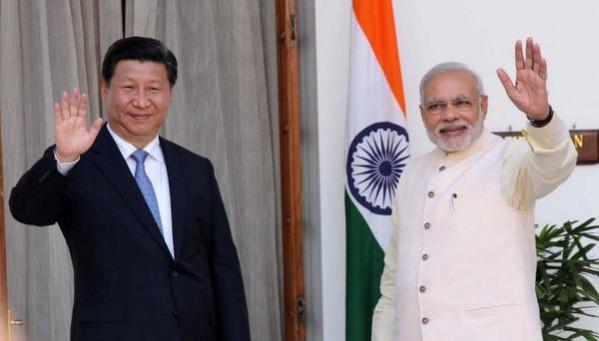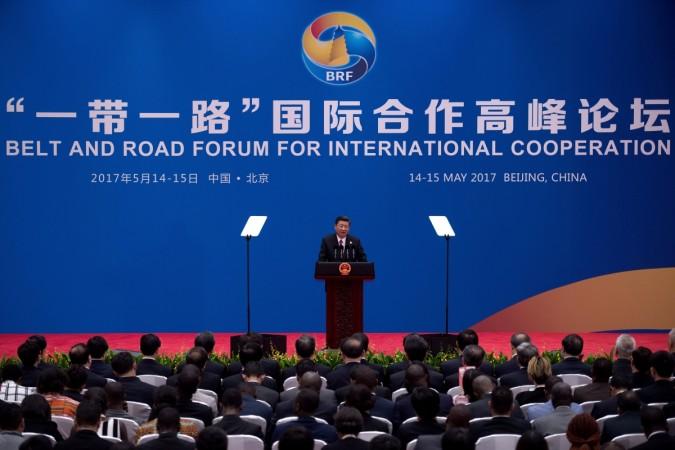
External Affairs Ministry spokesperson Gopal Baglay said on Wednesday, June 7, that there was a possibility of a "bilateral meeting" between Prime Minister Narendra Modi and Chinese President Xi Jinping at the Shanghai Cooperation Organisation (SCO) scheduled to be held in Astana in Kazakhstan on June 8-9. However, Baglay clarified that the meeting between the two leaders has not been confirmed yet.
It was earlier being speculated that Modi and Jinping would hold a meeting on the sidelines of the SCO Summit amid tensions between India and China over several issues, including the China-Pakistan Economic Corridor (CPEC), India's entry into the Nuclear Suppliers' Group (NSG) and the Sino-Indian border dispute.
The Shanghai Cooperation Organisation (SCO) is all set to formally introduce India and Pakistan as the six-nation grouping's newest members at its summit in Astana in Kazakhstan starting Thursday, June 8. Baglay on Wednesday said that "trade, connectivity, energy, banking and fight against terrorism" would be the "main areas of cooperation."
Chinese officials were quoted by PTI as saying that Beijing considers the Modi-Jinping meeting as important because this is the first time both leaders would meet this year after India boycotted China's high-profile Belt and Road Forum that was held in the country in April this year. World leaders from 29 countries had participated in that forum.
India had refused to attend the Belt and Road Forum due to concerns over $50 billion worth CPEC project, which is an important part of the One Belt One Road Initiative and passes through Gilgit and Baltistan in Pakistan-occupied Kashmir (PoK). Meanwhile, China has also consistently blocked India's entry into the NSG and its move to list Jaish-e-Mohammed (JeM) leader Masood Azhar as a global terrorist at the UN.

SCO will not support attempts to "internationalise" bilateral disputes
The SCO will not support any attempt to "internationalise" bilateral disputes, Chinese experts have said. This comes amid the organisation's move to formally introduce India and Pakistan as its newest members at the summit this week.
Pakistan has consistently sought to raise the Kashmir issue on all international platforms despite India's reluctance to do the same. However, Chinese experts have said that the SCO will not support any attempt to internationalise bilateral disputes.
"SCO members will support them and offer help if the two countries need it, rather than internationalise their dispute within the organization," Li Wei, an anti-terrorism expert at the China Institute of Contemporary International Relations affiliated to China's Ministry of State Security, told the Global Times. Wei added that "India and Pakistan are accusing each other of 'supporting terrorism' and this is generally based on their domestic political agenda and dispute."
"In short, the SCO is not a place for India and Pakistan to quarrel, but a platform for members to settle their disputes," Lin Minwang, an international relations expert at Shanghai's Fudan University, was quoted as saying by India Today.
SCO may support China's One Belt One Road Initiative
The SCO may support China's One Belt One Road initiative at the summit this week. "All SCO members are participating in the Belt and Road initiative, and this organisation is the initiative's security guarantee," Wang Yiwei, a scholar at Renmin University said.
Anti-terror expert Li said that the One Belt One Road initiative "helps Pakistan's economic development and security, and if Pakistan becomes a wealthy and prosperous country, it would be difficult for extremism and terrorism to grow." He added that this would "improve conditions along the India-Pakistan border... So I don't think India and Pakistan should quarrel within the SCO, because they will find more reasons to cooperate."
The SCO supporting China's pet initiative would not be of particular concern for India for two reasons. First, India will not have a say in this year's final communiqué because it will be formally inducted into the group at the end of the two-day summit. Second, the SCO takes takes decisions through consensus and usually stays away from territorial issues which is why it is unlikely to support the CPEC, which is a more important concern for India.









